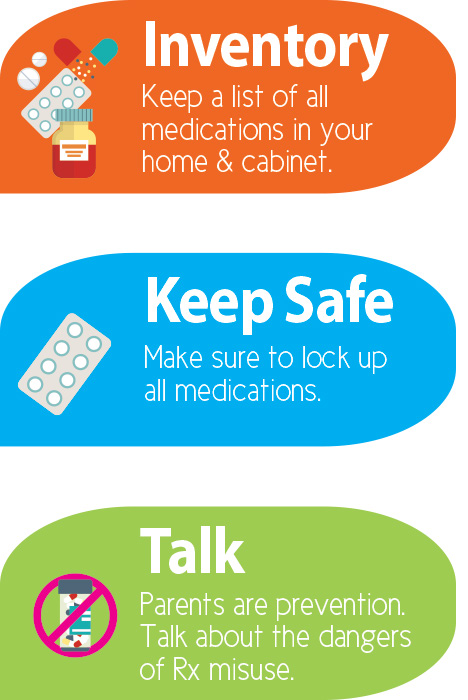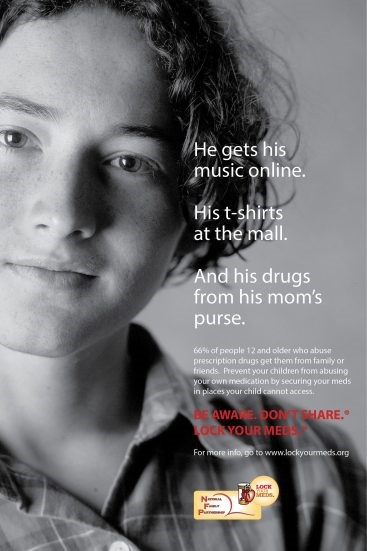Prescription Drug Prevention
Quite frequently young people merely open the medicine cabinet and there before them is a variety of drugs available for the taking: pain pills for post surgery; sleeping pills from an overseas airplane trip; cough medicine from last season’s flu. The time to act is now. You are the key to your child’s drug-free future.
Prevent!
What is prescription medicine abuse?
Prescription (Rx) medicine abuse is the use of an Rx medicine to create an altered state, to get high, or for any reasons other than those intended by the prescribing doctor.
How many teens are doing this?
According to research conducted by the Partnership for Drug-Free Kids, one in four teens say they have taken a prescription medicine – that was not prescribed to them — at least once in their lifetime. This behavior cuts across geographic, racial, ethnic and socioeconomic boundaries.
Why are some teens doing this?
Teens are engaging in this dangerous behavior for a variety of reasons. In some cases, they do it to party and get high, but also to manage stress or regulate their lives. Some are abusing prescription stimulants used to treat attention deficit hyperactivity disorder (ADHD) to provide additional energy and the ability to focus when they’re studying or taking tests. Many teens are abusing pain relievers and tranquilizers to cope with academic, social or emotional stress.
What are the risks?
There are both immediate and long-term risks to medicine abuse. In the short term, overdosing can be fatal, as can mixing Rx medicine with over-the-counter medicine and/or alcohol. In the longer term, prescription opioids (pain relievers) and other prescription medicines have been proven to be potentially addictive. Relying on Rx medicines at a young age to help “manage” life can establish a lifelong pattern of dependency and prevent teens from learning important coping skills.
Where are teens getting prescription medicine?
Two-thirds (66 percent) of teens who report abuse of prescription pain relievers are getting them from friends, family and acquaintances. Some teens share Rx medicines among themselves—handing out or selling their own pills or those they’ve acquired or stolen from classmates. A very small minority of
teens also say they get their prescription medicine illicitly from doctors, pharmacists or over the internet.
What Should Parents do?
- Educate yourself – Visit drugfree.org and MedicineAbuseProject.org for information, tools, resources and support.
- Communicate the risks of prescription medicine abuse to your kids. Children who learn a lot about the risks of drugs at home are at least 20 percent less likely to use drugs than those who do not get that critical message from their parents.
- Safeguard your medicine. Keep prescription medicine in a secure place, count and monitor the number of pills you have and lock them up — and ask your friends and family members to do the same.
- When Opioid Pain Relievers Are Prescribed For Your Child: What You Should Know
- Get help. If you think your child has a problem with prescription medicine abuse, please call Southwest Michigan Behavioral Health at 800-781-0353
Lock!
Many people who misuse prescription medications get them from family and friends. Only five percent of children who misuse prescription medications say they get them from a stranger or a drug dealer.
The Lock Your Meds campaign aims to educate people about the importance of securing medications to prevent them from being accessed by children, family members or visitors
Be Aware. Don’t Share. Lock Your Meds.
What You Can Do!
- Remove drugs from your medicine cabinet; hide them, lock them up or take them out of your house.
- Safeguard all medicines that have to remain at home by monitoring quantities and controlling access.
- Take inventory by writing down the names and amounts of medications you currently have and regularly check to see if anything is missing.
- Properly dispose of all expired or unused medication.
Dispose!
Proper Disposal of Prescription Drugs
Medicines play an important role in treating certain conditions and diseases, but they must be taken with care. Unused portions of these medicines must be disposed of properly to avoid harm.
See our list of safe disposal locations below!
Federal Guidelines
Do not flush prescription drugs down the toilet or drain unless the label or accompanying patient information specifically instructs you to do so. For information on drugs that should be flushed visit the FDA’s website.
To dispose of prescription drugs, you may be able to take advantage of community drug take-back programs or other programs, such as household hazardous waste collection events that collect drugs at a central location for proper disposal. Click here to find the Calhoun County Household Hazardous Waste take back dates, times and locations.
If a drug take‐back or collection program is not available:
- Take your prescription drugs out of their original containers.
- Mix drugs with an undesirable substance, such as cat litter or used coffee grounds.
- Put the mixture into a disposable container with a lid, such as an empty margarine tub, or into a sealable bag.
- Conceal or remove any personal information, including Rx number, on the empty containers by covering it with black permanent marker or duct tape, or by scratching it off.
- Place the sealed container with the mixture, and the empty drug containers, in the trash.
*Office of National Drug Control Policy
Killer in the Cabinet

Brenda’s Story

Substance Abuse Council
Contact Us

34 West Jackson Street, Suite 2A
Battle Creek, MI 49017
269-326-4040
Helpful Links
© Substance Abuse Council | Designed by GreenStreet Marketing
